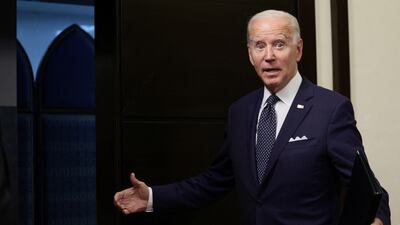US President Joe Biden said on Friday he would take steps on his own to reduce climate emissions after efforts to pass legislation through Congress collapsed once again.
“If the Senate will not move to tackle the climate crisis and strengthen our domestic clean energy industry, I will take strong executive action to meet this moment,” Mr Biden said in a prepared statement.
The Democratic president did not say specifically what steps he would take. He said his actions would address climate change, create jobs, bolster US energy security and domestic manufacturing, and shield the economy from fossil fuel price spikes.
For more than a year, Democrats have struggled to pass a sweeping domestic policy bill that would boost incentives to reduce climate emissions, lower prescription drug costs and raise taxes on corporations and the wealthy.
Those talks appeared to collapse after Joe Manchin, a lone Democratic holdout, told Senate Democratic Leader Chuck Schumer this week that he would only support legislation that lowered prescription drug pricing and would be unwilling to back proposed tax increase and climate provisions, a Democrat briefed on the conversations said.
Democrats want to pass legislation by August, when many states set healthcare premiums.
Mr Manchin told a West Virginia radio station that he was still open to talks, but he said he would only support quick action on the drug pricing aspect of the plan and wanted to hold off on the other elements.
“I want climate. I want an energy policy,” he said. “I would not put myself through this if I wasn't sincere.”
Mr Manchin represents the coal-producing state of West Virginia and has been sceptical about some efforts to tackle climate change.
Without Mr Manchin's support, Democrats would be unable to advance the legislation in the Senate, which is divided 50-50 between Republicans and Democrats.
“Senator Manchin's refusal to act is infuriating,” Democrat Martin Heinrich said on Twitter.
That would leave them unable to deliver on major portions of Mr Biden's domestic agenda before the November 8 midterm elections, in which Republicans are favoured to win control of at least one chamber of Congress.
Mr Biden will now have to rely largely on executive actions to tackle climate change, such as issuing new Environmental Protection Agency rules on power plant emissions and limiting oil and gas activity on public lands.
Those rules could be overturned by future presidents.
Democrat Sheldon Whitehouse said Mr Biden could impose a carbon border tariff on imports from countries with relatively worse carbon emissions, require carbon capture from major emitters and impose stronger emissions controls on vehicles.

